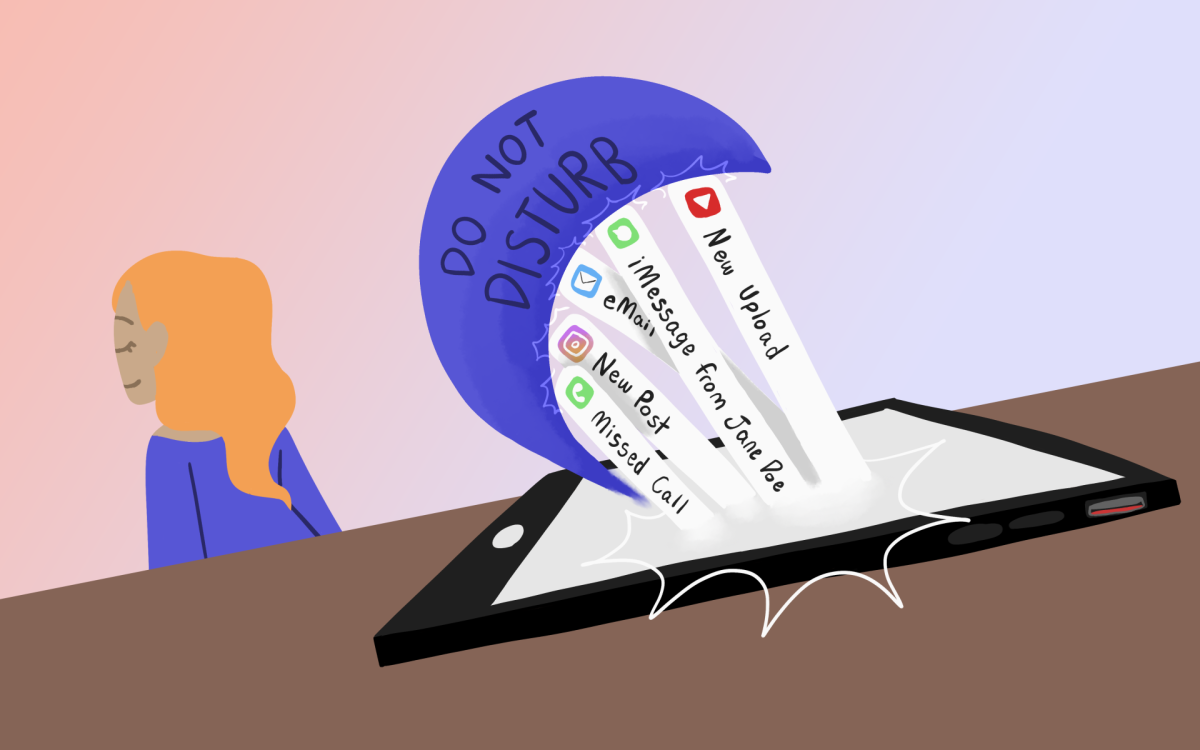If you’ve texted me within the past year, there’s a good chance that you saw, “Nadine has notifications silenced,” pop up at the bottom of your screen.
This is not me trying to ignore notifications altogether, but rather a boundary that I am setting between myself and whoever is texting me. It’s also letting them know that I may not see it right away, and therefore, it may take me longer to respond.
“Boundaries are deciding what limits that you want to have in relationship to your time, or other people,” said Rebecca Michel, associate chair of DePaul’s counseling program in the College of Education. “It’s deciding what is right for you.”
Everything and everyone we want to access is on our smartphones, at our fingertips, making connection a top priority.
Every day, dozens of emails are sent to our inboxes. Notifications on our phones pinging constantly from coworkers, professors, bosses, friends and family.
Most times, we aren’t able to just ignore these notifications, especially as college students who want to appear timely and professional to potential employers and other higher-ups. And when it comes to our personal lives, we can’t leave people hanging in fear that they’ll say we “ghosted” them.
Still, we can’t be in go mode all the time. Some days, we want to be left alone. Unfortunately, we can’t tell our employers or professors that we need some alone time.
But what do we do when we want it to stop?
Of course, we can turn off our phones or silence notifications, but that only postpones the work until we shift back into work mode.
However, is there such a thing as being too accessible?
The answer is yes.
I will admit that having my phone on the “Do Not Disturb” setting so often gets me in trouble, especially with friends that I mainly communicate with through text. By putting my phone on DND, I often forget to respond to some messages or don’t see them at all.
At first, I was selfishly confused as to why my lack of response would upset anyone. I thought, “I can’t be that important.”
The truth is, my response did not matter; it’s the fact that it’s common for people who don’t get a response immediately to take it personally.
“Many people understand that if another person does not respond quickly to their messages, it is a sign of disinterest and that they do not care about the other person,” said Aura De Los Santos, clinical and educational psychologist at E-Health Project. “This can add a lot of pressure on the recipients because people assume sending a message to someone means getting a quick response.”
I’ve been on both ends of this argument: I’ve been the person who doesn’t respond for hours or even days on end, and I’ve been the person checking my phone every two minutes to see if I got a response back.
The problem here is that everyone is expected to be reachable all day, every day. The constant pressure to respond to people in a timely manner, and keep up on conversations causes people to be on their phones more than they need to be.
I can use my current situation as an example: I’m at the library trying to get this story done before my deadline. But my mom and I are texting, and she’s one of the people who gets upset when I don’t respond for a while, and since I’m already on my phone, I start scrolling through my camera roll for fun or making a new Spotify playlist because why not?
It’s a constant back and forth between work and play, but unfortunately, play takes over more often than not.
“If possible, have different devices that you use for work or professional settings … if you can’t have two different computers, then you can just even use two different browsers,” Michel said. “Also, just setting limits for yourself. … You can put timers about how long you want to spend on certain apps or even your phone in general. I really recommend doing that.”
However, setting limits does get a little bit trickier once in a professional setting, especially with Generation Z entering the workforce. Setting boundaries with employers can feel awkward and may not even occur to some people as something they can do.
According to a study done by the University of Toronto, “…those with job-related resources report that their work interferes with their personal lives more frequently, reflecting what we refer to as the ‘stress of higher status.’”
When it comes to balancing work life and home life, it’s all about keeping the two separate, and communicating those needs to those who need to hear it — in this case, your employers.
“It is so important to set these habits early on in your career so that you have a really good work-life balance or integration,” Michel said. “I work with a lot of people who experience burnout. And oftentimes, it’s because they are taking their work home with them.”
Setting boundaries can be scary and uncomfortable. But if we want to have a healthy relationship with our phones, workplaces, friends and family, we must work through the uneasiness of it all.








